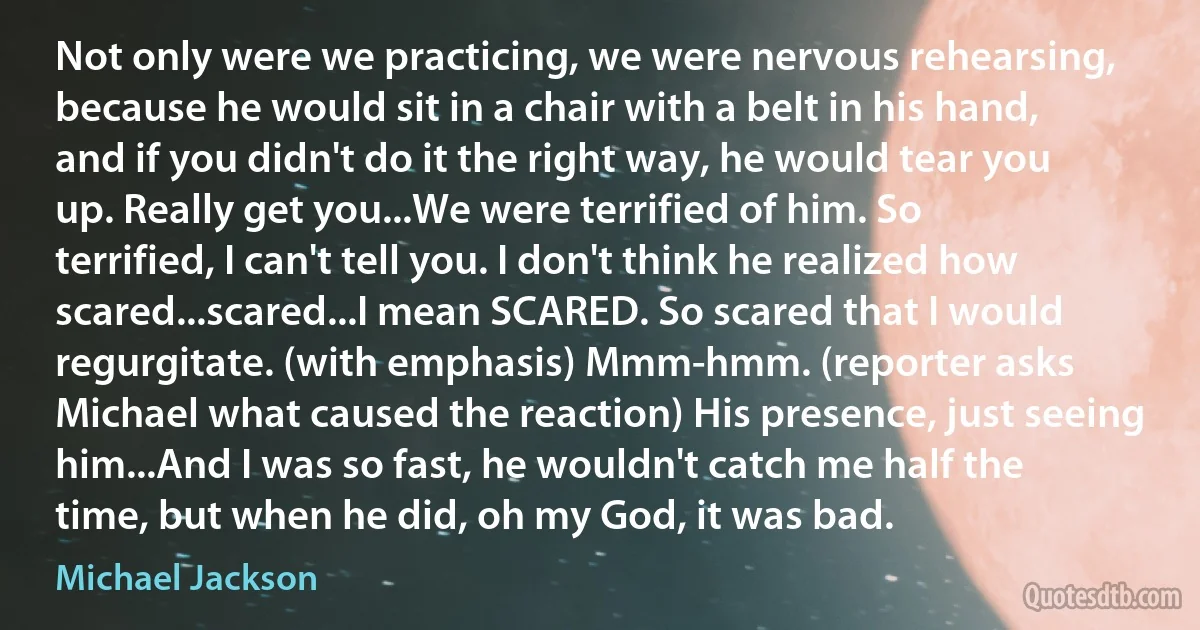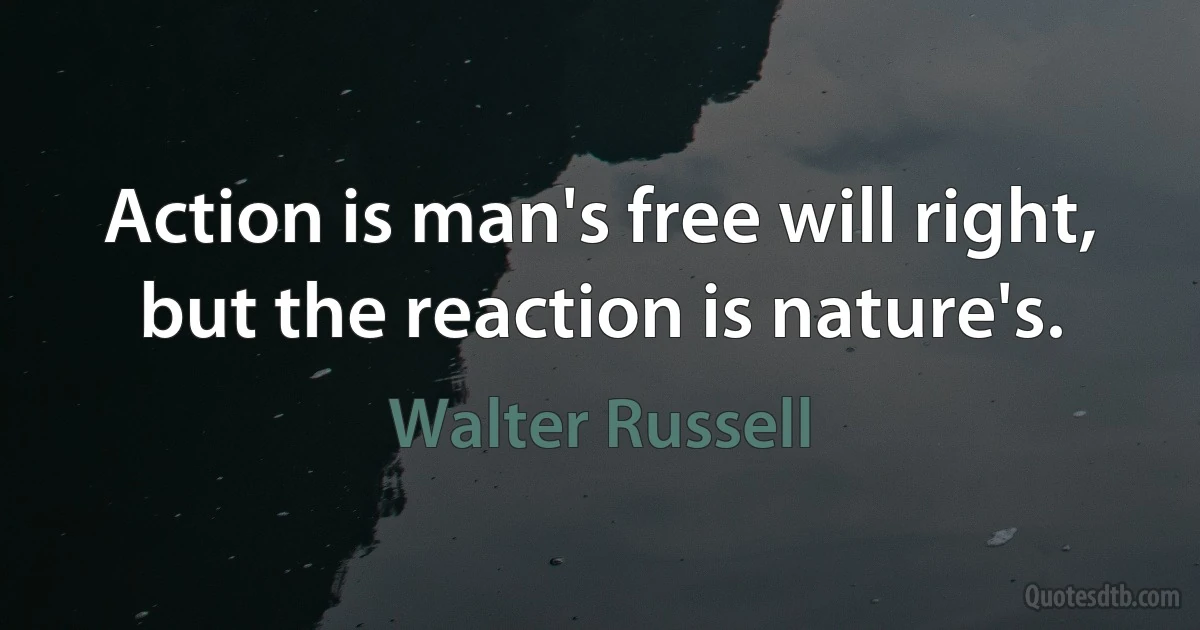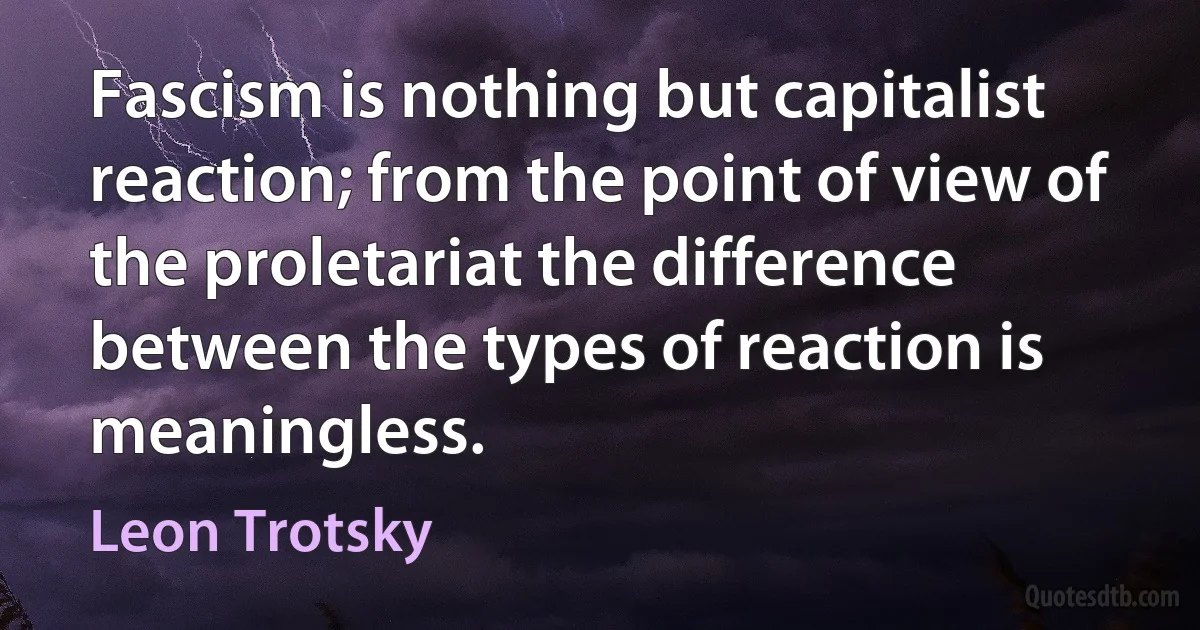Reaction Quotes - page 11
We had a Negro psychiatrist, Madison Presnell, working with us, and I had been trained to be a very liberal person about Negroes, which meant that you didn't have feelings. It was a phony kind of liberal thing. I went out of my way to be liberal. You know, that very self-conscious kind of equality. And Madison and I turned on together and I looked at Madison, and there we were, the same human beings. It was just that he was wearing that skin and I was wearing this skin. And it was no more or less than that. It was that shirt and this shirt and it had no more relevance than that. And I looked at that, and suddenly there we were, whereas before I had been so busy with my super-liberal reaction to color of skin, that I couldn't relax enough to share this unitive place.

Ram Dass
Fascism, since that is the word that is used, fascism presents, wherever it manifests itself, characteristics which are varied to the extent that countries and national temperaments vary. It is essentially a defensive reaction of the organism, a manifestation of the desire to live, of the desire not to die, which at certain times seizes a whole people. So each people reacts in its own way, according to its conception of life. Our rising, here, has a Spanish meaning! What can it have in common with Hitlerism, which was, above all, a reaction against the state of things created by the defeat, and by the abdication and the despair that followed it?

Francisco Franco
As result a new kind of theory to be applied on a class of motions ... these geometric motions are that which acquire different parts of a system of bodies, without neither perturb themselves nor the other and consequently these motions do not depend of the action or reaction among the bodies, but only upon the conditions of their connections, and thus being determined only by geometry and not dependent of the rules of dynamics.

Lazare Carnot
There are street artists. Street musicians. Street actors. But there are no street physicists. A little known secret is that a physicist is one of the most employable people in the marketplace - a physicist is a trained problem solver. How many times have you heard a person in a workplace say, "I wasn't trained for this!" That's an impossible reaction from a physicist, who would say, instead, "Cool. A problem I've never seen before. Let's see how I can figure out how to solve it!"

Neil deGrasse Tyson
People keep on wanting fetish figures, and things like that are very popular. That's Pop art. There was an enormous resistance to Abstract Expressionism and there still is to that school, which is not dead at all. But Pop art came as a reaction to that because kids can't paint abstract expressionism unless they're under five year of age. Because it really is tremendously hard work and it's very challenging. But the point is, people love an immediately recognizable word – if you put a word in anything, they lie it.. .I am not interested in culture at all. Once a work of art has gotten into the culture, its dead as far as I'm concerned. I think there is a difference between art and culture. Or as the sage once said, 'Art is what we do; culture is what is done to us'.

Carl Andre
There's no such thing as advice to the lovelorn. If they took advice, they wouldn't be lovelorn. You see, advice and lovelorn don't go together. Because advice makes love sound like some sort of cognitive activity, but we know that it isn't. We all know that it's some sort of horrible chemical reaction over which we have absolutely no control. And that's why advice doesn't work.

Fran Lebowitz
The image that creates this thinking gives rise to a feeling of evidence and a conviction that it is not based on reason. This kind of thinking explains the reaction we so often note among our contemporaries: when someone asks them to give the reason for their opinions, they answer: "It's evident." This thinking, which creates prejudices and stereotypes, is the domain of the unquestionable. Obviously you cannot dispute with an image, and you cannot challenge the hero of a film. But this extends to the mental images produced by the film: there is no criticism or debate possible, because these involve differing methods of thought. What produces immediate assent cannot bear the discussion process. The conviction acquired in this way can only be attacked on its own ground: by other images.

Jacques Ellul
Sight, when used in the context of nature, creates direct communication with reality. It implies that one is involved in this particular reality and quickly leads a person to action. But when the image has become artificial and is purely a means of knowledge, the reaction persists. I feel directly involved in what I see, just as prehistoric people did. And if I am seeing objects or ideas, I am not truly independent; I cannot really take my distance from these objects. From the intellectual point of view, this means I cannot really exercise my critical faculties. The use of images to transmit knowledge leads to the progressive elimination of distance between a person and his knowledge, because of the way we are made to participate when this means is used (this is, of course, in perfect accord with technical civilization, and to be desired by its standards). The critical faculties and autonomy of the thinking person are also eliminated.

Jacques Ellul
We were not prepared intellectually. Those of us in the national security field still carried the baggage of the Cold War. We thought in concepts of coalition warfare and the Warsaw Pact. When we thought of terrorism, we thought only of state-sponsored terrorism, which is why the immediate reaction of many in our government agencies after 9/11 was: Which state did it? Saddam, it must have been Saddam. We had failed to grasp, for a variety of reasons, the new phenomenon that had emerged in the world. This was not state-sponsored terrorism. This was religious war. .... This was the emergence of a transnational enemy driven by religious fervor and fanaticism. Our enemy is not terrorism. Our enemy is violent, Islamic fundamentalism.

John Lehman
It is a consolation to remember that corruption pushed beyond a certain point provides its own remedy, and that this sort of thing cannot indefinitely continue; but it is less consoling to remember another truth, to wit, that the correction of political and social evil may come in the form of irremediable catastrophe, and that the innocent, who are the greater number, would then suffer most. It is still less consoling to remember the universal human experience that when evil is redressed by the only partly conscious force of reaction, it is not succeeded by a corresponding good, but by some other new and unexpected evil.

Hilaire Belloc
In all the countries where fascism became victorious, we had, before the growth of fascism and its victory, a wave of radicalism of the masses -- of the workers and the poorer peasants and farmers, and of the petty bourgeois class. In Italy, after the war and before 1922, we had a revolutionary wave of tremendous dimensions; the state was paralyzed, the police did not exist, the trade unions could do anything they wanted -- but there was not party capable of taking the power. As a reaction came fascism.

Leon Trotsky



